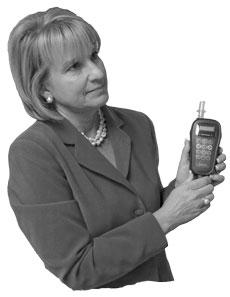HB 1423 looks to make drunk driving non-starter

Debra Coffey demonstrates the testing process on an ignition interlock device.
Jefferson City, MO. – Joplin resident Kerry Freeman has been known to spend her spare time on the side of the road.
Freeman, whose daughter Christina was killed in 2006 by a drunk driver, was one of many to appear at the hearing of House Bill 1423. Now, Freeman volunteers her time bringing food and drinks to police officers at checkpoints.
Sponsored by Rep. Neal St. Onge (R- Ellisville) the HB 1423 mandates the installation of an ignition interlock device on the car of a Missourian convicted of driving while in intoxicated. Ignition interlock devices require drivers to submit a breath sample so as to calculate their blood alcohol content. Anyone registering a BAC higher than the interlock’s pre-set standards will not be able to start their car until they test under the limit. Drivers also must take additional tests at random while driving.
“If you see 100 cars on your drive home, statistically, three of those cars will have drivers who have DWIs,” St. Onge said, “That’s pretty scary.”
St. Onge believes interlock legislation would curb what he calls “a serious problem in Missouri,” while still allowing citizens to drive legally.
Installation of the devices cost roughly $70 with approximately $70 in operating costs a month. If HB 1423 passes, the cost would be absorbed by the offender. Currently, interlocks are an option in Missouri for legal driving after a DWI conviction, however, license suspension is a more common penalty.
“75 to 80 percent of people keep driving,” said Dr. Richard Roth, who testified as an expert witness. Roth worked extensively with similar legislation that has been passed in New Mexico. According to Roth, interlock devices have been “successful in lowering the arrest rate,” for DWI as well as lowering alcohol related fatalities.
The bill has met minimal opposition, though the inconvenience for others who use the car, along with the possibility of fooling the device or falling victim to false positive have been cited as possible problems.
Anyone using mouthwash containing alcohol would not be able to pass the interlocks test, however, according to Debra Coffey of Smart Start, an interlock producer, said mouth alcohol, like that present after using mouthwash, disappears relatively quickly.
“You just wait one to two minutes,” she said, “We encourage users to stay away from mouthwash, or products like Binaca.”
Though interlock devices can restrict drivers in their personal automobile, St. Onge says they still may drive other cars illegally.
“‘I’ll be the first to admit you can’t allow for everything,” he said.
Your donation will support the student journalists of Missouri Southern State University. Your contribution will allow us to purchase equipment and cover our annual website hosting costs.



























